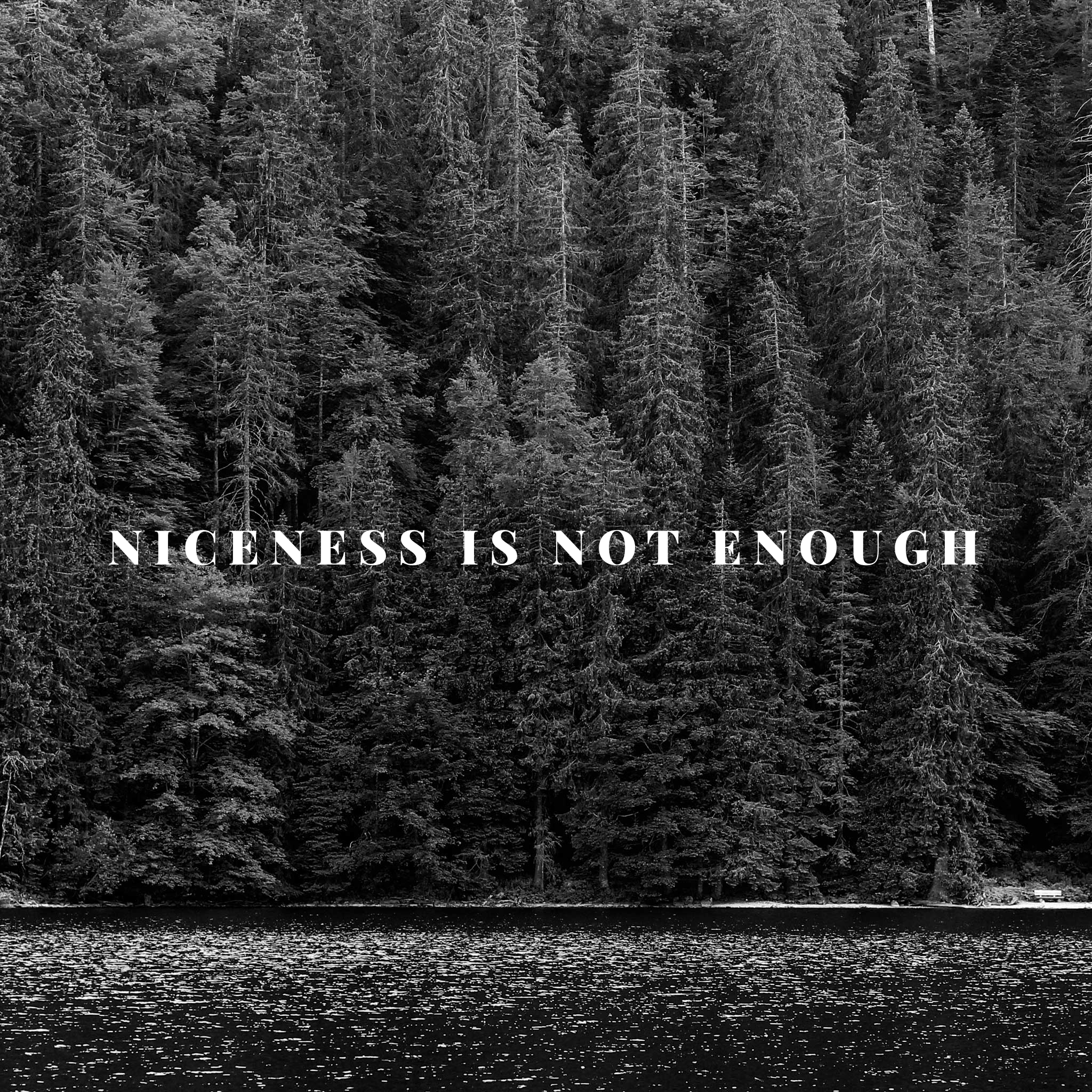Niceness is Not Enough
My U.S. History teacher was a nice woman. She was polite. She seemed like kind of a gentle soul. She was also the first person I met who seriously referred to the Civil War as the War of Northern Aggression. And that's when things got complicated. Even as a 17 year old lifelong South Carolinian, I knew that there were all kinds of problems with that statement. But I didn't say anything.
I didn't say anything because I was 17 and my teacher was nice to me. But of course she was nice to me. I was a respectful white kid who was darn good at U.S. History. This isn't to say that she was mean to anyone. I doubt I ever heard her raise her voice. But it was easy for me to push aside my unease with her language about the Civil War. She was nice and I was not going to run afoul of that niceness unless I set out to do so.
Being nice in the South can cover a multitude of sins. We take our hospitality seriously. The worst thing a Southerner can be is rude. It's the metric on which we judge someone's character (unless you're at a football game and then all bets are off). That's why whenever there is a violent crime committed down here there is always a neighbor being interviewed on the news who is shocked because "he seemed so nice." We have this difficulty believing nice people, especially nice people like us, are capable of anything truly heinous.
When the president claimed that there were good people amongst the white supremacists in Charlottesville, part of me was shocked. I had seen the pictures of those torch-lit faces full of menace and hatred. I had seen the stars and bars and swastikas defiantly wielded in broad daylight. I laughed, but part of me also found that Southern wavelength. If I ran into these guys sitting in rocking chairs outside a Cracker Barrel, they'd probably be nice to me. And if someone is nice to me, then they seem like "good people."
I still bristle at the idea of good people amongst the supremacists in Charlottesville that day. All the footage seems like it was mainly neo-Nazis and casual Friday Klansmen, etc. But the president thinks that there was a bunch of nice people out there just not wanting a statue to be torn down. Nice people wanting to defend their nice Southern heritage. So let's do a thought experiment and assume that not everyone there outright hates Jewish people, African-American, and immigrants. Let's play along and say there were some who just want their statue.
The trouble is that nice can't cover the multitude of sins that make up this specific slice of Southern heritage. Niceness cannot erase that maintaining slavery was the stated reason for Southern secession. We can talk about states' rights all we want, but the right that these states wanted to keep was the continued subjugation and dehumanization of millions of men, women, and children. All the niceness in the world cannot undo the reality that, as one of my colleagues said today, what is a flag or the statue of a general to a white Southerner might as well be a burning cross to one of our African-American neighbors.
A couple of summers ago, when South Carolina was finally talking about removing the Confederate flag from the statehouse grounds, I considered Jesus' command that we love our neighbor and I wrote the following:
Despite whatever attachment one might have to a flag, however he or she may see that symbol, the Confederate battle flag represents centuries of cruelty to the vast majority of our African-American brothers and sisters. It is a reminder of slavery, Jim Crow laws, anti-civil rights battles, lynchings, and racism in all of its forms. Those feelings are not the result of some sort of conspiracy. They are valid and they are a stain upon our nation's history.
So why would we ever want to fight for something that causes our neighbors pain? Why would we want to celebrate a symbol that to many represents an ugly past and a present still fraught with difficulties? If we were in the shoes of our neighbors then how would we feel? When we defend a banner at their expense, are we truly loving them?
You cannot nicely ask someone to continue to be subjected to something that evokes so much pain. You can pour all the Southern charm and sugar you want on it, but at the end of the day, you're still asking someone to drive by parks and monuments that serve as a reminder that people considered them animals and property. And that some people still see them that way. People like the ones who marched in Charlottesville last weekend.
Sure, some may not use the n-word. They may even act nicely toward the African-Americans they meet and claim with full sincerity that they are not racist. But at the end of the day, even if there were "good" people marching, they were asking that a painful racist reminder remain in their neighbor's lives and that is not good. It is selfish. It is evil. It is sin.
Lest I get too comfortable, the mask of niceness runs all along the spectrum. We can declare racism is a sin and want to take down these monuments. We can pray and preach. But at the end of the day, most of our efforts to end racism come down to simply being nice. We let discriminatory voting practices continue to stay in place. We let our politicians offer empty platitudes but don't press them to do anything about it because, when it comes down to it, it doesn't effect us.
We try to rescue our African-American neighbors rather than listen to them. We ignore the fact that we are privileged to have benefitted from a rigged system. We forget that this is a fight from which we can walk away. Charlottesville was a horrifying reminder, but it's a persistent reality for others. We don't actually do the work because we're nice. We're doing so much better than our predecessors did. So we're content with that.
I fear that I am in that group. I'm thankful that we as Southerners are nice. I think it's a wonderful trait, but I hope we don't use that as a mask. I want us to be good rather than nice. As I wrote this past weekend, I pray that I can get out of the boat to follow God. I hope I can learn. But I have to realize that there is a long way for me to go. I don't want to be a nice neighbor. I want to be a good neighbor. Niceness is not enough.









